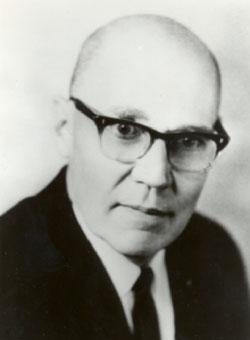About Kling L. Anderson
 Dr. Anderson assumed leadership of the Pasture Management program in the Department of Agronomy in 1938 and remained on the faculty at Kansas State University over the next 29 years, interrupted by two years absence to complete the requirements for his Ph.D. at the University of Nebraska and as a Fulbright Fellow to New Zealand. Anderson provided research that was extremely important to the ranching industry, not only in Kansas, but worldwide. His pioneering research on fire effects in grasslands served as a model for later research by many hundreds of researchers.*** Broken a:289603 agronomy-2020: Agronomy Custom CSS ***
Dr. Anderson assumed leadership of the Pasture Management program in the Department of Agronomy in 1938 and remained on the faculty at Kansas State University over the next 29 years, interrupted by two years absence to complete the requirements for his Ph.D. at the University of Nebraska and as a Fulbright Fellow to New Zealand. Anderson provided research that was extremely important to the ranching industry, not only in Kansas, but worldwide. His pioneering research on fire effects in grasslands served as a model for later research by many hundreds of researchers.*** Broken a:289603 agronomy-2020: Agronomy Custom CSS ***
He, in concert with Soil Conservation Service personnel, developed the vegetation-soil relationship concept and published a landmark paper in 1955 that is still the basis for range site classification by governmental agencies throughout the nation. His impact was never more evident than recently, when grass varieties he developed were used extensively in the Federal Conservation Reserve Program. The basic recommendations for sowing those grasses were also contributed by Anderson.
His early research on stocking rate effects also was the springboard for later research by others that resulted in more efficient grazing systems for grasslands in the Great Plains. Few researchers have had such a lasting impact on the range management profession. That impact was imparted through more than 60 technical publications and 100+ popular articles concerning efficient use of rangelands.
In recognition for his outstanding professional achievements and the many ways in which he rendered service to the society, Anderson served on the Board of Directors and was elected a Fellow of the American Society of Agronomy. He was a charter member of the Society for Range Management, the 1972 recipient of the SRM Outstanding Achievement Award, and served as the president of the Kansas-Oklahoma section of that society. He also was selected as an Honorary member of the Soil Conservation Society of America. Further testament to his outstanding contributions was the American Grassland Council Merit Certificate for recognition of outstanding service to grassland agriculture.
He also held memberships in the Ecological Society of America, Kansas Academy of Science, the Grassland Research Foundation, and the New Zealand Grassland Association. Perhaps, Dr. Anderson's greatest impact came when he served as a revered and friendly advisor to many undergraduate and graduate students. He was major advisor for 7 Ph.D. and 22 MS students. Those students have gone on to distinguish themselves in the range profession.
The excellence of his graduate studies effort was attested to by election by his peers as one of the first recipients of a Faculty Lectureship at Kansas State and his receiving the Gamma Sigma Delta Distinguished Service Award. He was elected to numerous honor societies, including Sigma XI, Phi Kappa Phi, Alpha Zeta, and Gamma Sigma Delta. Dr. Anderson had exemplary moral fiber and ideals. The term gentleman fit him well. When dealing with scientific or personal integrity, there were no compromises. His impact on the lives of those who were fortunate enough to have known him was profound and lasting. This Lectureship was established to commemorate and celebrate his achievements.